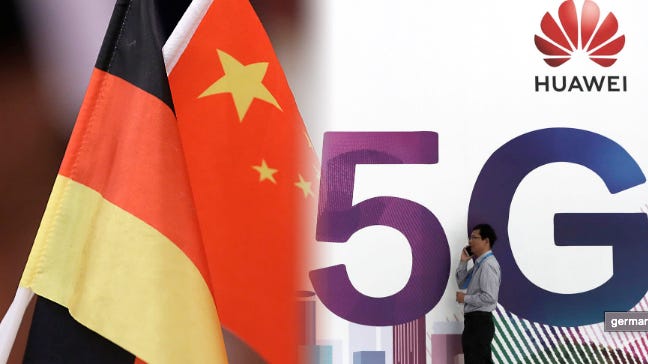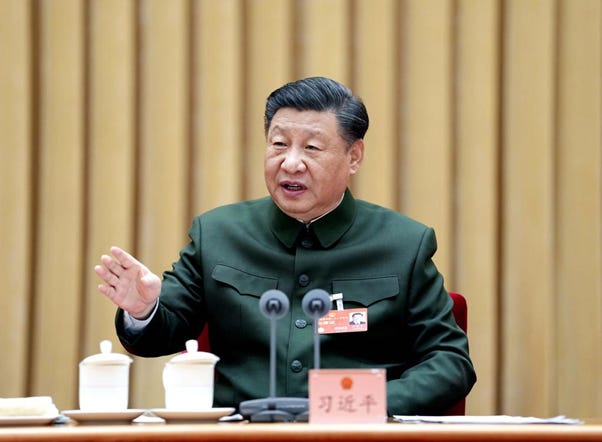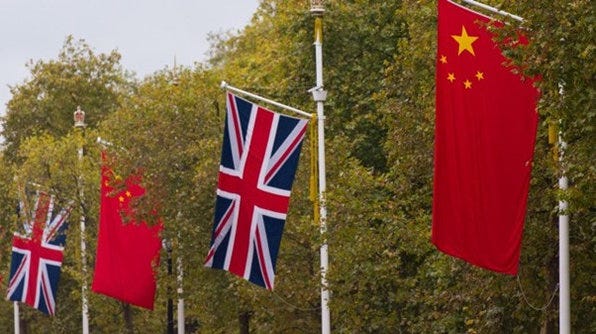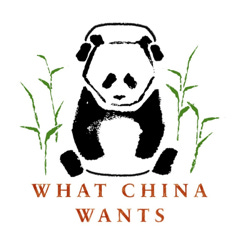The Evenstar Institute's Weekly Chinese Influence Bulletin 11 March 2023
German Huawei ban, China and the Caribbean, TikTok security, concerns about UK university sector
Hello and welcome back to What China Wants.
Every week we publish the newsletter of the Evenstar Institute, the parent of What China Wants and a think tank dedicated to measuring and understanding national influence in the 21st century.

ABOUT THE EVENSTAR BULLETIN
The Evenstar Institute's weekly bulletin comprises updates on changing global influence, macro supply chain events, and other China-related news. We will also highlight books, articles, events, and episodes of our podcast, What China Wants.
If you have any questions about the contents of the bulletin or the Institute's research, get in touch via our website.
INFLUENCE UPDATES
Germany’s potential ban on Huawei and ZTE from parts of its 5G networks
Digital Infrastructure
Germany is reportedly considering banning certain components from the Chinese companies Huawei and ZTE within its telecoms networks, according to a government source quoted by Reuters. Furthermore, an interior ministry paper on the review obtained by Reuters stated that a specific supplier could be banned from providing critical components if it were deemed to be directly or indirectly controlled by the government of another state, implying a focus on the Chinese champions.
This would be a potentially significant move to address security concerns, and is set within a broader re-evaluation by the German government of its relationship with China, its top trade partner.
On 7 March an interior ministry spokesperson confirmed that the German government was carrying out a general review of telecoms tech suppliers, but stated that this was not directed at specific manufacturers. This approach fits with the government’s pattern of caution when it comes to pushback on China, and a reticence to expressly single out Huawei, even when pursuing legislation enabling it to crack down on the firm.
The spokesperson added that the review could lead to Germany asking operators to remove and replace components already built into networks, and that current legislation did not foresee compensation for them in such circumstances.
Responding to reports in German media, the Chinese embassy in Germany released a statement that Beijing would be “very puzzled and strongly dissatisfied” if such a decision was taken. Meanwhile, China's foreign ministry responded to Reuters’ request for comment with a statement that it hoped Germany would "make an independent decision in line with its own interests, economic patterns and international rules that does not receive interference from a third party".
Source: Xinhua/Li Gang
President Xi calls for all national strategies to be brought together to strengthen the nation
Government and Administration, Defence and Security
On 8 March, President Xi emphasised the need to open new ground for enhancing integrated national strategies and strategic capabilities. He made the remarks during the first session of the 14th National People’s Congress (NPC), while attending a plenary meeting of the delegation of the People’s Liberation Army (PLA) and the People’s Armed Police Force.
According to Xinhua, Xi said such a move has “profound significance in building a modern socialist country in all respects and advancing the great rejuvenation of the Chinese nation on all fronts, as well as in achieving the goals for the centenary of the PLA in 2027 and more quickly elevating the armed forces to world-class standards”. The phrase ‘achieving the goals for the centenary of the PLA in 2027’ has attracted particular attention, given previous reports that President Xi had instructed the PLA be capable of regaining Taiwan by force by 2027.
In his speech, Xi issued a series of calls to accelerate the build-up of self-reliance in science and technology, bolster strategic capabilities in emergency fields, make industrial and supply chains more resilient and make national reserves “more capable of safeguarding national security.”
This program can be interpreted as dovetailing several existing national strategies, such as the ‘Made in China 2025’ policy that seeks to make China dominant in global high-tech manufacturing and the strategy of military-civil fusion (MCF, 军民融合), first actively promoted under Hu Jintao at the 17th Party Congress in 2007.
TikTok launches project to allay China security fears
Finance, Trade, and Investment Digital Infrastructure
On 8 March TikTok launched new security measures termed ‘Project Clover’ in an attempt to allay concerns it could be made to share user data with China. The BBC has reported that under Project Clover a separate security company will “monitor data flows” and TikTok will make it harder to identify individual users in data. A similar plan, named Project Texas, is taking place in the US.
Additionally, the company announced ‘security gateways’ as an extra layer of control over employee access to European user information and data transfers outside of Europe. As part of its efforts to store European data locally, TikTok also announced plans for two new data centres, at a cost of EUR 1.2 billion (GBP 1.1 billion) per year, in Dublin, in addition to one already announced, and the Hamar region of Norway. Both of these will be operated by third parties.
Although the company has reportedly been working on Project Clover since 2022, the measures have been announced as TikTok faces increasing pressure following the latest ban by the European Commission of the ByteDance-owned app from staff devices. Furthermore, on 7 March, the day before it was announced, US President Joe Biden lent his administration’s support to a Senate bill granting powers to ban foreign-owned technology, increasing the likelihood of future targeting of the company in the United States.
Following the announcement, TikTok’s US head of public policy, Michael Beckerman, told BBC Radio 4's World Tonight programme on 7 March that the company feared becoming a "pawn" in diplomatic tensions between the US and China. "It would be hard to deny that we're caught up in those very broad geopolitics that really have nothing to do with us”, he said.
US generals issue warning over Chinese influence in South America and the Caribbean
Defence and Security, Finance, Trade and Investment
On 8 March, during testimony to the House Armed Services Committee, two senior US generals, General Laura Richardson and General Glen VanHerck, issued stark warnings about the expansion of Chinese influence in South America and the Caribbean. Within their comments, they focussed on the expansion of the Belt and Road Initiative in both regions, but also made allegations around Chinese investment practices, and highlighted the potential for China to build dual-use space facilities there.
The rhetoric of both generals was notably adversarial. General VanHerck was quoted as describing Chinese actions in the Caribbean as “very aggressive”, while Richardson described Beijing as “taking advantage” of South American nations by pushing them into a “debt trap associated with the multiple loans” that Beijing provides.
Furthermore, General VanHerck specifically singled out the Bahamas, stating that China had “built the largest embassy in the world there” complete with an ambassador who “uses the information space to undermine us each and every day.”
In terms of US response, Richardson stated that while the US also has “a lot of investment” in South America, it does not advertise it enough, and consequently countries in the region seeking contracts for big projects “only see PRC and Chinese bidders”. Once again, VanHerck highlighted the Bahamas, and pointed out that the US has not had a permanent ambassador there since 2011, and that appointing one would “vastly help”.
OTHER NEWS
How should the universities sector respond to dependency on China?
On 7 March, in a series of comments for the i newspaper the head of the universities sector has advocated Britain sending more students to study in China. Vivienne Stern, chief executive of Universities UK (UUK), which represents more than 150 universities across Britain, reportedly told i that it would be “good for both of us” if the UK encouraged more young people to study at Chinese universities.
Recently, concern has been building about the dependency of UK universities on income from Chinese students. Indeed, leading figures in the university sector such as Adam Habib, director of SOAS University of London, have voiced concerns that a “catastrophic” collapse in relations with China could cause many UK institutions to go bust, because their current funding models are highly dependent on Chinese students.
According to figures from the British Council, since 2013 more than 67,000 people from the UK have participated in study, internship and teaching programmes across China. However, this is in stark contrast to the number of Chinese students attending British universities, with almost 115,000 enrolling in 2022 alone, the highest of any country.
Ms Stern stated that “We should be encouraging more UK students to spend time in China, to learn Chinese, and to spend time in Chinese institutions.” Furthermore, she also indicated that China’s increasingly flourishing university sector means that British students should be thinking about “full degrees” in the Asian country, as well as the “study abroad-type model”.
However, Ms Stern also highlighted that the move would have to tread a fine geopolitical balance, as British universities attempt to disentangle themselves from their over-reliance on Chinese students in the context of increased tensions between Beijing and the UK and its allies. In her comments, she explained that many British universities have begun drawing up contingency plans to deal with their Chinese student populations in the event of a “real fracture in the relationship” between the two countries, such as if China were to seek reunification with Taiwan.
Source: iNews/Ben Pruchnie/Getty Images
CSIS launches 'Interpret: China' Project
Washington-based think tank the Center for Strategic and International Studies (CSIS) has been developing an archive of translated Chinese documents including speeches, government documents, newspaper articles, and academic papers, which it calls the ‘Interpret: China’ project. The project, which began in 2022, is open source, and aims to used ‘newly translated primary source material to fuel discussion on strategic topics relation to U.S.-China relations and China’s rise’. Documents are selected based on the insights they can provide for policymakers, companies, researchers, journalists, and the broader public, and their importance for China’s policymaking.
The project promises to allow Western policy-makers to engage directly with Chinese government statements and, crucially, gain an insight into China’s own thinking and internal debates about bilateral relations. As Nikkei reports, it is already having an impact. CSIS hosted a panel of defence experts earlier this week based on a selection of the translated papers. Participants noted the many common reference points of Chinese and U.S. policy debates, and the importance that understanding China’s thinking has for ensuring that U.S. actions are not misread with potentially negative consequences.
The Interpret: China project helps to fill a significant gap in Western understanding of China. The project represents an invaluable resource for informing government and private decision-making in the West, especially as tensions between China and the U.S. are increasing and the importance of avoiding misunderstandings becomes ever-greater.
THE PODCAST
This week on What China Wants, we return to one of our audience’s favourite topics, the economy of China. Sam interviews Stewart on the latest figures and what this might mean for the rest of the world. Click here to listen.
You can also listen to the podcast on Apple, Amazon, or Spotify.
ABOUT THE EVENSTAR INSTITUTE
The Evenstar Institute is a non-partisan, not-for-profit think tank focused on measuring and understanding the evolving nature of national influence in the twenty first century.
If you would like to support us, please visit the donate page on our website.





